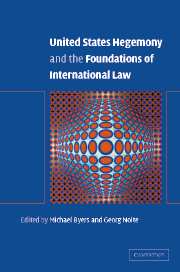Book contents
- Frontmatter
- Contents
- List of contributors
- Preface
- Introduction: the complexities of foundational change
- PART I International community
- PART II Sovereign equality
- PART III Use of force
- PART IV Customary international law
- 10 Powerful but unpersuasive? The role of the United States in the evolution of customary international law
- 11 Hegemonic custom?
- 12 Comments on chapters 10 and 11
- PART V Law of treaties
- PART VI Compliance
- Conclusion
- Index
10 - Powerful but unpersuasive? The role of the United States in the evolution of customary international law
Published online by Cambridge University Press: 13 July 2009
- Frontmatter
- Contents
- List of contributors
- Preface
- Introduction: the complexities of foundational change
- PART I International community
- PART II Sovereign equality
- PART III Use of force
- PART IV Customary international law
- 10 Powerful but unpersuasive? The role of the United States in the evolution of customary international law
- 11 Hegemonic custom?
- 12 Comments on chapters 10 and 11
- PART V Law of treaties
- PART VI Compliance
- Conclusion
- Index
Summary
Contemporary societies are interdependent, some more dependent than others. They have been directed by governments that are themselves interdependent, whose role has been reduced – or at least redefined – and which are forced to act together to avoid being on the defensive. States have gone from being independent to being interdependent; they have to coordinate their actions. That has become so constraining that I sometimes compare this joint sovereignty to a tedious and interminable meeting of a tenants' association! But it is also a school in global democracy.
Hubert Védrine, former Foreign Minister of the French RepublicThe premise that underlies the prescient initiative of our two editors is that the United States, as the sole superpower in the post–Cold War era, is likely to play a preponderant role in the evolution of contemporary international law. Understanding the particular role of the United States is indeed crucial for students of contemporary international law and politics. I nonetheless argue that in the fundamental regime of customary law the assumption of preponderant influence is unwarranted. The United States is materially more powerful than any state has ever been. However, for reasons related to the complex identity of the United States, and to changes in our understanding of the creation and operation of customary international law, the United States is currently less influential in the elaboration of customary legal norms than is often presumed.
- Type
- Chapter
- Information
- United States Hegemony and the Foundations of International Law , pp. 287 - 316Publisher: Cambridge University PressPrint publication year: 2003
- 6
- Cited by

